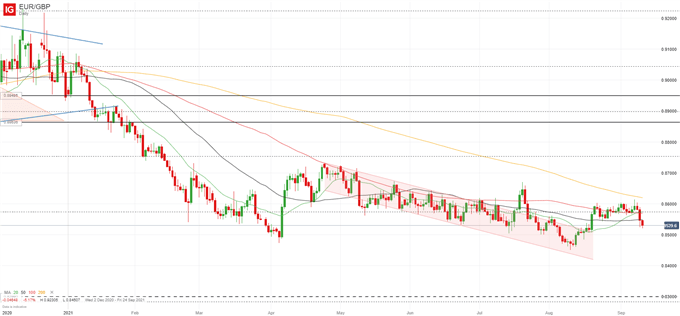GBP Analysis & News
- UK MPs approve a controversial bill to raise taxes for businesses and employees
- GBP drops on announcement as many fear it will hinder economic recovery
- UK CPI and PPI in focus next week
Boris Johnson has put his controversial new plan to raise the national insurance tax by 1.25% to a vote this week as he plans to raise funds for social care and the NHS after the pandemic has caused a backlog of appointments.
The PM saw some backlash after announcing the proposal earlier this week, including some Tory dissidents, as it goes against his election promise made back in 2019 about not hiking taxes. Some have questioned its ability to actually raise new funding for social care and pointed out that lower-income workers that were worst hit by the pandemic would be the most affected.
On announcement, industry experts were calling for the proposal to be scrapped as it would make it even tougher for business which have been struggling over the last 18-month to employ people. There were also calls for the tax to be applied to unearned wealth and capital gains, with dividend income also expected to see a 1.25% increase.
There were also questions about the time frame as many experts believe it would take more than 3 years to clear the NHS backlog, and it would be best to raise funds and have them directly managed by the NHS experts.
Nonetheless, the uproar expected had mostly fizzled out on Tuesday when Johnson presented his plan to the House of Commons, and with a voting majority and only a small few rebels expected within the party it was passed through Parliament on Wednesday afternoon.
GBP REACTS
The Pound had come under pressure after the announcement on Tuesday, as it is considered to put further strain on already struggling businesses. GBP has been underperforming its counterparts, with EUR/GBP hovering around a 7-week–high, especially at a time when emphasis is being put on economic recovery and the rate hike could be seen as a headwind for the UK’s recovery. The pair has since pulled back after the ECB’s meeting on Thursday, but concerns remain about the performance of the Pound in the next few months as businesses attempt to regain normalcy after 18 months of disruptions.
GBP OUTLOOK
The Pound has been a strong outperformer for most of the year so far thanks to an effective vaccination campaign and fast economic rebound. But concerns have been rising recently regarding the slowing of momentum in the economic recovery, which is also hindered by Brexit and the end of the furlough scheme. So adding a higher tax burden to businesses and individuals is seen as a drag on the economy in such a crucial time, which is likely to put pressure on the Pound on the longer term.
Also to consider is the unwinding of market perception regarding the Bank of England’s tightening schedule, as a tightening fiscal policy reduces the need for a tightening in monetary policy, which would also play against the Pound as it will narrow the rate differentials with other central banks.The longer-term effect will largely depend on trader’s perception of how well the tax hike can be used to aid social pressures in the economy, especially when faced with an aging population and an ever-growing demand for health and social care.
EUR/GBP Daily Chart

The Pound has finished the week with a positive note, with EUR/GBP being the biggest loser of the GBP crosses. Euro, Sterling is probably one of the best pairs to trade UK-centric events and data as it lacks the influence of other safe-haven currencies like the USD and JPY. EUR/GBP has had a solid attempt at breaking higher since mid-August but has not been able to garner the bullish momentum needed to consolidate above 0.86 and so the reversal lower is putting the pair at greater risk given the amount of rejection faced over the last two weeks.
In the calendar next week focus will be on UK inflation data out on Wednesday, with CPI expected to jump up to 2.9% after unexpectedly dropping in July. If so, this will be the highest reading since February 2018 and will back the Bank of England further into a corner with regards to asset tapering and price stability. The August PPI will also be released on Wednesday, with most analysts predicting a decrease in the rise of input and output prices on a monthly basis, which could be a signal of weaker inflation flowing down the production line in the next few months.
Learn more about the stock market basics here or download our free trading guides.
— Written by Daniela Sabin Hathorn, Market Analyst
Follow Daniela on Twitter @HathornSabin
|
|


Leave a Reply
You must be logged in to post a comment.